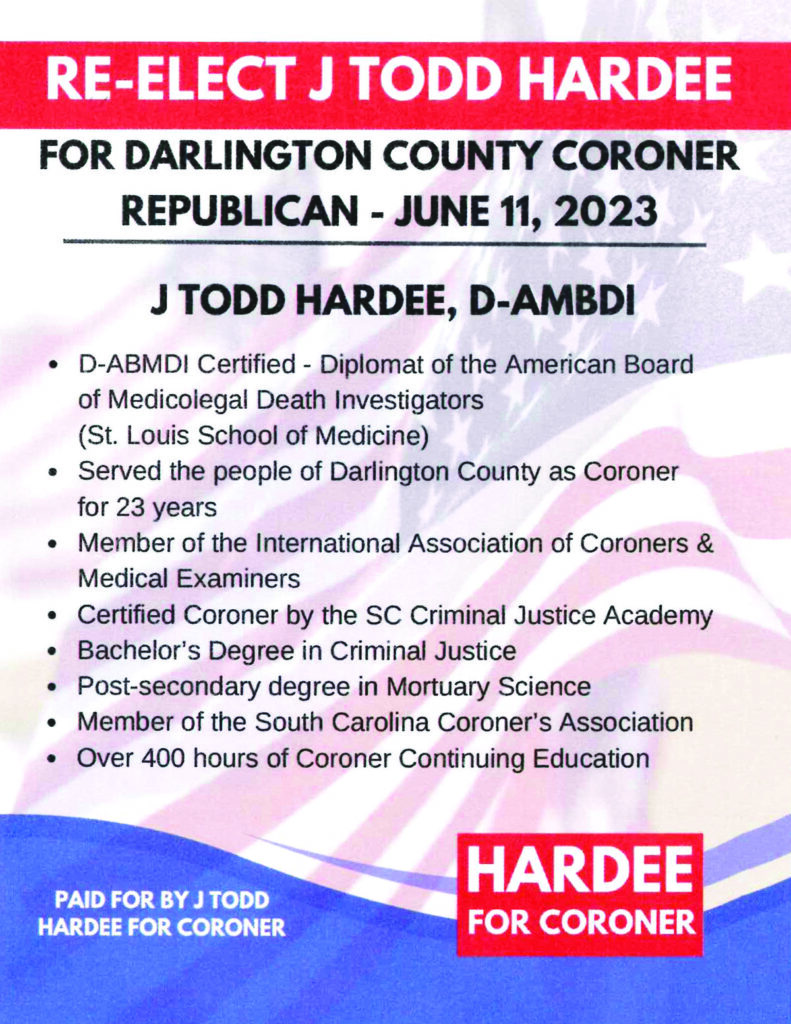A look back: The Lunch Box, where eats were treats

By Samantha Lyles, Staff Writer, slyles@newsandpressonline.com
Ask most Darlingtonians of a certain age about the best place they ever ate, and a fair percentage of them will likely cite a long-gone eatery called The Lunch Box. Housed in a nondescript white block building on North Main, that restaurant turned out reliably delicious home-style meals for over fifty years, and its legend persists even today.
Like many small town legends, The Lunch Box had a humble origin story. In the early 1920s, Hannah Edwards was a schoolteacher looking to supplement her small income, so she teamed up with her cousin Mary Edwards – who had eye trouble and could not teach – and opened a sandwich shop.
Each cousin invested $50 into the business, a not inconsiderable sum for the times. Their first shop was described by Hannah as a “little hole-in-the-wall place” on Pearl Street, with one kerosene stove, four tables, and a “cute little cook named Fannie.” An aunt suggested they call their eatery “The Lunch Box” in reference to the sandwich staples that were their specialty.
They bought a block of ice each day from a roving wagon and packed their sandwich supplies on ice in a trunk. By hard work, word of mouth, and sheer frugality, they made it through the early lean months and built a reputation for tasty food and reliable catering by providing banquet fare for the Kiwanis Club and other social gatherings.
In 1924, Mary and Hannah decided to expand the business and moved the restaurant to Main Street across from the grand old McFall Hotel. Even though the menu expanded to include full meals, The Lunch Box name had become familiar in town and the wise proprietors decided to keep it. Business picked up, but they remained cautious, buying only one T-bone steak at a time for fear of wasting valuable food.
From early on, the business was a family venture. Hannah’s sister Jo worked there summers until she retired from teaching, at which point she joined the team full time. Mary’s sister Florence Horton employed her charm for many years as hostess. Mary’s mother, Aunt Mamie, cooked homemade rolls. Hannah’s mother made legendary ice cream. When roasts or hams were served at large gatherings, the Edwards ladies asked their fathers to carve the meat.
During the Depression, The Lunch Box relocated to the McFall Hotel dining room, and for two years the Edwards family fed three meals a day to a small army of teachers boarding there.
“We served the best breakfast in town, a good old country breakfast,” Hannah wrote in an article for “Acorns,” a Darlington history newsletter.
Unhappy with the old kitchen equipment and lack of independence at the McFall, they eventually moved back across the street to their old digs at 188 North Main Street and bought the building. Then things really started cooking.
Hannah wrote that the secret of their success was that every dish – from the fresh vegetables to the desserts to the famous biscuits – was made from scratch. When diners would compliment the food and request recipes, the Edwards’ referred them to their cooks, who remained stubbornly vague regarding their trade
secrets.
“The cooks wouldn’t tell them what they did. They would say, “You just put a little of this and a little of that,”” Hannah recalled, citing Cleo Coe and Leola Brown (and Leola’s mother, who cooked their for 36 years) as some of their top kitchen magicians.
Rosie Sundeen, Mary’s niece, says she ate at the restaurant nearly every Sunday and later worked at The Lunch Box after school as a teenager. She remembers the caramel ice cream and buttermilk-soaked fried chicken as distinctly delicious, and the atmosphere was so exciting that she fantasized about making it a career.
“I remember thinking that this was what I wanted to do, to take over The Lunch Box. But by the time I got a little older and went to college, I realized how much time it took, that running that place was almost a 24/7 commitment,” Sundeen says.
Many restaurants offer good food, but customers often become regulars because of personal friendships with staff – a fact the Edwards family knew quite well. No meal at The Lunch Box was complete without some conversation about
family, work, church, the growing Darlington Raceway, or just life in general. That country hospitality resulted
in positive reviews from food critics and adoring diners far and wide, even garnering The Lunch Box a stamp of approval from food magnate Duncan Hines.
Catering provided a profitable sideline, with scarcely a week going by without a series of parties, weddings, and meetings catered by The Lunch Box. Sundeen says that even when The Lunch Box didn’t handle the main dishes, few parties were complete without some yummy cookies and cakes from the Edwards kitchen. Hannah estimated that between the restaurant and catering, they were feeding an average of 150 people per day by the time she and Mary retired in 1981.
Darlington grieved the loss of The Lunch Box, which had spent 56 years under the same management and had become an integral part of the town. Still, despite the loss, no one could argue that the Edwards ladies hadn’t earned their rest.
“They were good, kind, old-fashioned Christian ladies,” Sundeen says of her kin.



Caramel Ice Cream
(recipe from Hannah Edwards of The Lunch Box)
2 qts + 1 cup milk
2 cups whipping cream
2.5 cups sugar
2 teaspoons vanilla
4 junket tablets
Caramelize 2.5 cups sugar
Pour caramel syrup into 1 qt of hot milk and stir until melted
Add junkets to lukewarm milk mix
Whip milk and junket milk in container and pour in churn
Let it set until congealed (light)
Churn for a while and then add cream and continue churning until hard to turn
Adding cream after churning a while makes it creamy!




